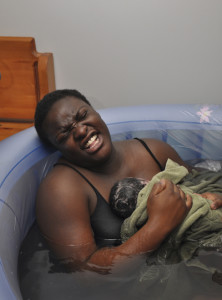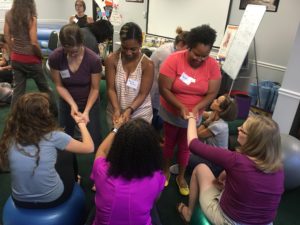Why would a white family hire a black doula? Good question, right? This blunt, layered quandary was posed to me at a recent meeting with African American community leaders in the Hillcrest and Pisgah View Public Housing Apartments in Asheville two weeks ago. It came up during one of many deep brainstorming conversations that have happened over the past few months in a search for solutions to serious problems surrounding lack of access to health care support within these communities.
Black babies die more often than white babies, both in the Western North Carolina and thro ughout the United States. The Office of Minority Health reports that African American women in the U.S. have 2.3 times the infant mortality rate as non-Hispanic whites. They are also 2.3 times more likely to begin prenatal care in the 3rd trimester, meaning that they receive no medical attention or support until they are ⅔ of the way through their pregnancies. An Amnesty International report, Deadly Delivery: The Maternal Health Care Crisis in the USA, revealed that African American women are nearly four times more likely to die of pregnancy-related complications than white women. These rates and disparities have not improved in more than 20 years.
ughout the United States. The Office of Minority Health reports that African American women in the U.S. have 2.3 times the infant mortality rate as non-Hispanic whites. They are also 2.3 times more likely to begin prenatal care in the 3rd trimester, meaning that they receive no medical attention or support until they are ⅔ of the way through their pregnancies. An Amnesty International report, Deadly Delivery: The Maternal Health Care Crisis in the USA, revealed that African American women are nearly four times more likely to die of pregnancy-related complications than white women. These rates and disparities have not improved in more than 20 years.
What has troubled me the most is that low-income African-American women, the women most likely to be affected by poor birth outcomes, are the least likely to interface with the kinds of support that could change these outcomes.
As a white woman of privilege, I can get overwhelmed with all this information and almost paralyzed as I think about how I could possibly be of service to these mothers. Fortunately, in May I had the opportunity to attend a Mother’s Appreciation Day event a the Pisgah View Community Center sponsored by MAHEC and the Community Centered Health Home Team. As soon as I entered the large, open-span facility, I saw that it was filled with some of the strongest, most loving and beautiful mothers I have ever met. In that moment, my heart spoke to me and my mind started to race. I knew what I could offer in service.
 Doulas to the rescue! One of the ways to solve these huge maternal and infant mortality health disparities is to recruit, train and support candidates of color into fields that provide education and high-quality physical and emotional care to Black mothers and families. I believe that birth and postpartum doulas and childbirth educators can positively impact infant mortality in the Black community. There is a needs gap for low-income African-American women, for culturally specific childbirth education, peer-model birth doulas, postpartum care and breastfeeding support. I also know that there are plenty of women of color who want to do this work, but they lack accessible pathways into the professions.
Doulas to the rescue! One of the ways to solve these huge maternal and infant mortality health disparities is to recruit, train and support candidates of color into fields that provide education and high-quality physical and emotional care to Black mothers and families. I believe that birth and postpartum doulas and childbirth educators can positively impact infant mortality in the Black community. There is a needs gap for low-income African-American women, for culturally specific childbirth education, peer-model birth doulas, postpartum care and breastfeeding support. I also know that there are plenty of women of color who want to do this work, but they lack accessible pathways into the professions.
I also believe that we can be each others best health care workers. When an under-served community identifies its leaders and creates access to education, opportunities, peer support and loving care, the potential arises to bring about change to the health disparity gaps within that community. I am also aware that people are more likely to connect with people of their own culture. When expecting parents can see themselves in role models of their own culture then they can see themselves emulating this behavior with their own birth, breastfeeding or parenting experience.
Having access to loving, non-judgmental, compassionate, culturally-appropriate support through pregnancy, birth and new parenthood will help achieve better health, better birth and better breastfeeding outcomes for African American women.
That day in May, I decided that if the women of Pisgah View and Hillcrest public housing communities would have me, I would bring a birth doula Training to them. Since then I have been working with the Community Centered Health Home Team (CCHHT) to do just that. The CCHHT is comprised of over 15 different local non-profit organizations including MAHEC OB, Pisgah Legal Services, YWCA and WIC, and is funded by a grant from Blue Cross Blue Shield Foundation.
With hopefulness and humility this November, I will be training 8-10 African American women to become certified birth doulas. My goal is not only to support them in becoming peer leaders who can provide support for families in their communities, but also to mentor them to become a part of our team of successful birth doulas at Homegrown Babies, serving all kinds of families in Asheville. I will also be mentoring one woman to become a birth doula trainer as well.
After the birth doula training my next goal will be to mentor these same community birth doula leaders to offer Lamaze childbirth classes for expecting women in their neighborhoods. Homegrown Babies Lamaze classes are about learning healthy self-care, creating connection, building confidence, and facing fears. We will teach skills and techniques that support women in exploring empowered responses to potential labor scenarios, managing pain, engaging partners and family members, and communicating effectively with care providers.
The majority of doulas here in Buncombe County are white and are currently hired by white middle class families. That is what prompted the question from a community leader in Pisgah View:
So why would a white family here in Asheville hire a black doula?
How did I respond? I took a deep breath and said “I have been in this community for 25 years and I know there are many young, forward thinking families who want to connect with the African American community here in Asheville, but the opportunity for intersection in our town is slim. I know many a family who would be honored to share their birth journey while crossing cultures. It is a chance to get to know members of our community in a deeper way, and this training has the potential to create avenues of sharing and support across the color line which is a huge step in the integration of our communities here in Asheville.”
Plus, they’ll hire them because we at Homegrown Babies will help make sure that they are damn good doulas. I am an excellent trainer and they will have the same access to skills, continuing education and mentorship that all of our doulas have. What gets a doula hired in our company is their unique personalities, strong communication skills and the ability to empathetically connect with a family.
Having a positive birth experience is a birthright not just reserved for Caucasian women or those with money. Every woman, regardless of race or class needs and deserves to be seen, to be heard, to be held and loved though these life-changing rites of passage.
And as a flawed, often scared, and very human woman who makes lots of mistakes, can I make a change? Can I humble myself in this conversation in my own city? Can I make a difference in this complex web of institutional racism and what seems to be an insurmountably entrenched web of racial health disparities?
Well, I don’t know the answers to those questions. I don’t know if my idea of training doulas and childbirth educators in under-served communities here in Asheville will make the positive change that I want it to. But I have hope, and I am going to cultivate the courage and do it anyway.


